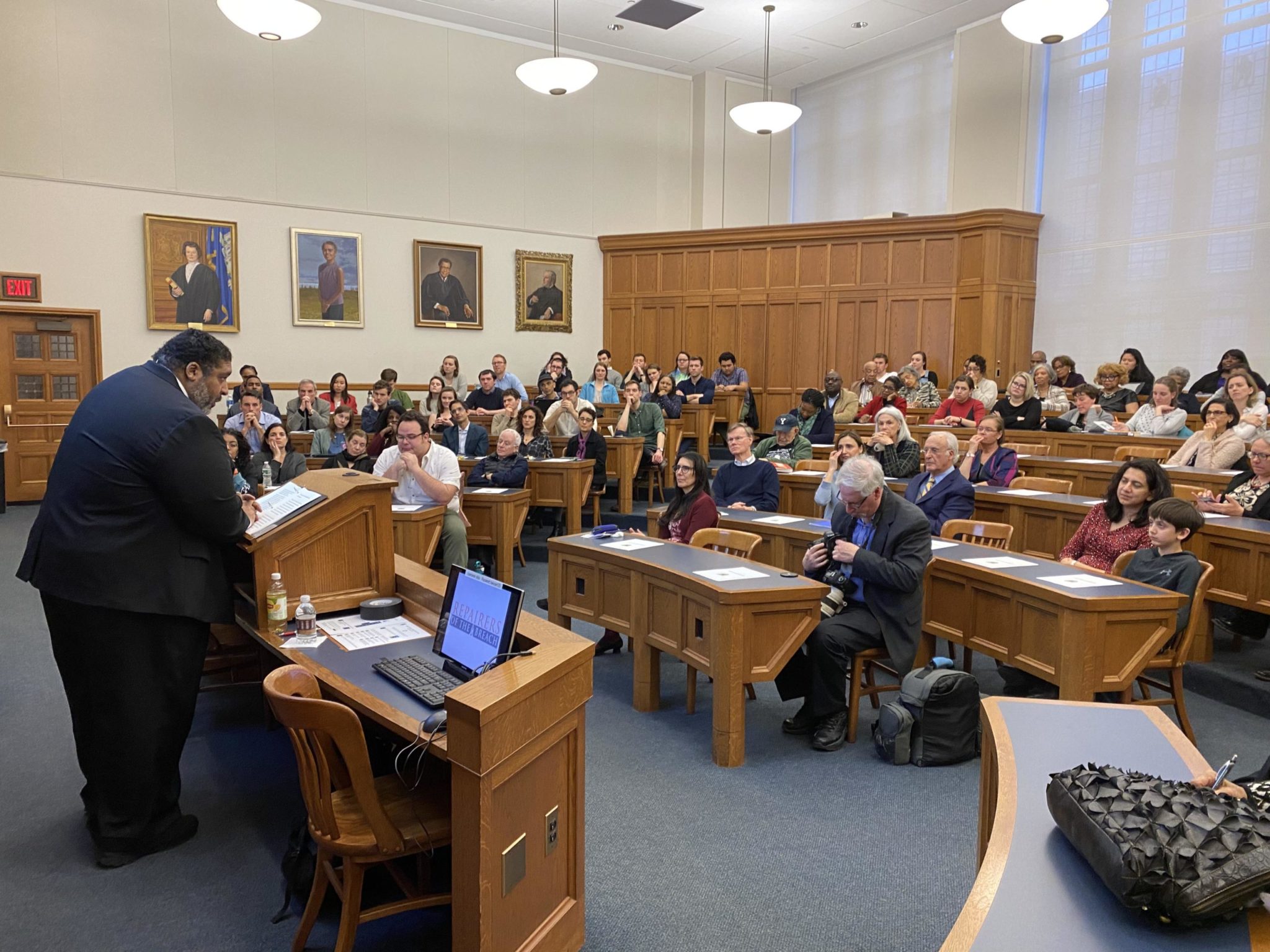
Courtesy Of Stephen Roach Knight
Reverend William J. Barber II argued in front of a law school crowd on Monday that America must tackle the issues of “racist voter suppression” and gerrymandering to address its political crisis.
On Monday, Barber delivered the Gruber Distinguished Lecture in Global Justice. The Gruber Distinguished Lecture in Global Justice and the Gruber Distinguished Lecture in Women’s Rights are signature lectures open to the entire Yale community and other interested groups. Invited speakers boast exceptional achievements pertaining to global justice or women’s rights. In his lecture, Barber spoke about the work he was doing with Repairers of the Breach, a leadership development organization he founded in 2014 that seeks to expand and build a national movement rooted in moral analysis, moral articulation and moral action.
“What we say in a real way is if you’re going to put your hand on the Bible, the Quran or whatever, and swear yourself into office, you need to know what’s in that Bible,” Barber said. “We’re also saying that about the Constitution. What we’re saying is every policy needs to be examined by [the Constitution]. Does it establish justice? Does it provide for the common defense? Does it promote the general welfare, and does it ensure domestic tranquility? If it doesn’t, then we will need to change. And that’s what we’re doing.”
According to the Repairers of the Breach website, the organization is working towards “a moral agenda rooted in a framework that uplifts our deepest moral and constitutional values” by challenging moral public concerns of treatment towards groups of people such as the “poor, women, LGBTQ people, children” rather than “abortion and property rights.”
Barber also co-leads with Liz Theoharis an American anti-poverty campaign called The Poor People’s Campaign that is intended to lift up issues of poverty, racism, voter suppression and ecological devastation.
“We need this movement because we cannot allow these injustices to go on,” Barber said. “What we need, my brothers and sisters at Yale Law School, is lawyers that will understand America will never become what she has long aspired to be until we tackle racist voter suppression and the legacy of systemic racism. How it is played out against black people, Latinos, Native people to create ecological devastation, the war economy and the false narrative of white nationalism.”
Since 1993, Barber has served as the pastor of Greenleaf Christian Church in Goldsboro, North Carolina, since 1993 and is a former president of the North Carolina conference of the NAACP, the largest in Southern United States.
Throughout his lecture, Barber focused on the different forms of racism, such as “institutional racism written into power” and her assertion that “the signs of racism seem more prevalent in our president crisis” due to the “power balance being disrupted by demographic shifts in America.”
“I think any law school that is serious about doing law in the 21st century, and doing law in a way that’s going to have impact on criminal justice reform, women’s rights, wages and labor laws, needs to have a serious focus on voter suppression,” Barber said. “It is at the center of what is undermining and creating what I call an ‘impoverished democracy.’ We often talk about all these things as though voter suppression is an isolated thing to what has come. Voter suppression is a systemic way of undermining the vote of the people and undermining future coalitions.”
Barber emphasized that the Poor People’s Campaign seeks to “build power” because it is “led by poor people” and “not with politicians.”
The campaign will hold rallies across the nation leading up to an assembly on the Mall on June 20, 2020.
“I thought it was really inspiring,” Clay Tamburri ’22 said. “I’d never heard of Reverend Barber before now, and he’s given me a lot to think about.”
Matt Post ’22 first heard about Barber when Barber delivered an address at the 2016 Democratic National Conference. He replayed Barber’s speech “over and over again” because he had “never heard someone articulate such a powerful moral vision before.”
In the spring of 2017, Reverend Barber sat with Post and three other youth gun control activists in Maryland to connect the activism they were doing with gun violence to “other systemic injustices and broader policy violence.”
“It was a profound, inspiring experience, and his speech today was the same,” Post said. “Reverend Barber just has this moral clarity to him. He can so beautifully tie together history, faith, righteous anger and optimism.”
Yale Law School is located at 127 Wall St.
Khue Tran | khue.tran@yale.edu







